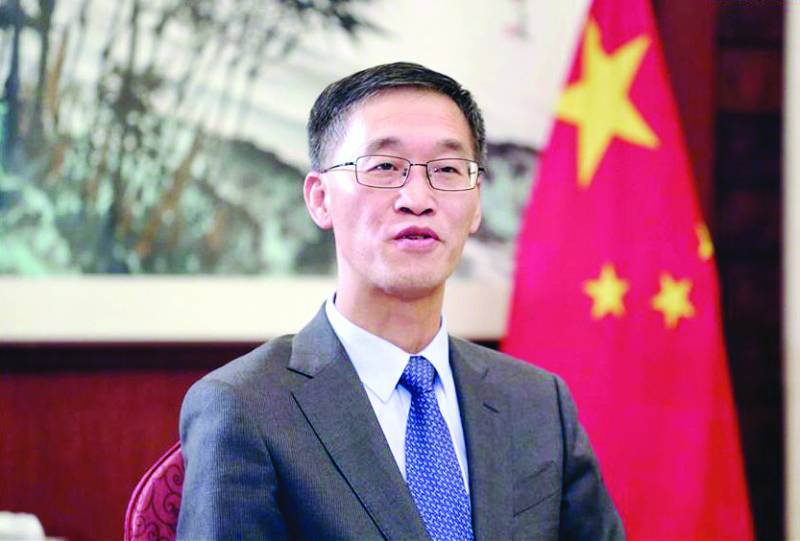ISLAMABAD/WASHINGTON - The United States and China on Friday clashed over CPEC prospects for Pakistan, which sees the multi-billion-dollar initiative as a game-changer for its ailing economy.
The US warned that CPEC will lead to long-term economic damage for Pakistan with little or no return. Speaking in Washington, US Acting Assistant Secretary of State for South Asia Alice Wells said CPEC would profit only Beijing and the US offered a better model. She added “It’s clear, or it needs to be clear, that CPEC is not about aid.”
In a strong reaction, Ambassador of China to Pakistan Yao Jing recalled “When in 2013, the Chinese companies were establishing power plants in Pakistan, where was the US? Why it did not invest in Pakistan’s power sector despite knowing that Pakistan was in dire need of electricity.”
Yao Jing called upon the media to play its role in nullifying the effects of propaganda against China Pakistan Economic Corridor (CPEC). “Media is a major vehicle of information and platform of interaction,” he said.
Speaking at the prestigious Woodrow Wilson International Centre for Scholars in Washington on Thursday, Alice Wells noted that the project was driven by non-concessionary loans and she said, “CPEC relies primarily on Chinese workers and supplies, even amid rising unemployment in Pakistan.”
The corridor “is going to take a growing toll on the Pakistan economy, especially when the bulk of payments start to come due in the next four to six years,” she said, reported Gulf News.
“Even if loan payments are deferred, they are going to continue to hang over Pakistan’s economic development potential, hamstringing Prime Minister Imran Khan’s reform agenda,” she said.
Wells said private US investment, coupled with US grants, would improve Pakistan’s troubled economic fundamentals. She said “Worldwide we see that US companies bring more than just capital; they bring values, processes and expertise that build the capacities of local economies.”
Speaking in the backdrop of Alice Wells’ statement, Chinese Ambassador Yao Jing said that Pak-China relations were based on win-win cooperation and were mutually beneficial.
Addressing the inaugural ceremony of the fifth CPEC Media Forum hosted jointly by the Chinese embassy, Pakistan-China Institute and China Economic Net in Islamabad on Friday, the envoy said China had always come forward to assist Pakistan in need without any political or government differences, saying that if Pakistan was in need, China would never ask Pakistan to repay its loans in time, however the International Monetary Fund (IMF), that is mainly governed by the West, was strict in its repayment system.
He questioned why the US had suspended its aid promised for Pakistan only because of political priorities.
The Chinese envoy expressed his astonishment over Alice Wells’ statement of higher tariff in power plants, established under CPEC, saying that he himself had earlier briefed her about the tariff structure of these power plants and told that the tariff structure was the lowest among all the countries to whom the Chinese companies provide electricity.
“When in 2013, the Chinese companies were establishing power plants in Pakistan, where was the US? Why it did not invest in Pakistan’s power sector despite knowing that Pakistan was in dire need of electricity”.
With respect to the US allegation of corruption in CPEC projects, Yao Jing said it was easy to allege anyone without having evidences. He said that he himself had discussed this matter with a number of concerned stakeholders including National Accountability Bureau (NAB), but did not find even a single evidence of corruption in any CPEC project.
“My dear American colleague, before alleging anyone, please be careful that you have enough evidences about certain allegations,” he added.
With regard to the Main Line (ML-1) railway project that is to be executed under CPEC, the Chinese envoy clarified that the project cost is around $9 billion, however it is only estimation and it is not final cost. “The real cost of the project will be finalised in the second stage of determining financial package of the project,” he said.
He also reacted the US blame of providing less employment opportunities to Pakistani workers in CPEC projects, saying that so far over 75,000 Pakistani workers had been given job opportunities in the projects and that by 2030, around 2.3 million jobs are expected to be created in CPEC projects. “I would be more happy to see more investment coming from the United States in Pakistan.”
Yao Jing siad China was determined to build capacities of Pakistani businessmen and industrialists to boost productivity in the country which would ultimately help in increasing the exports of Pakistan.
Under CPEC, he said China would provide industrial cooperation to Pakistan and for this purpose over two dozen leading Chinese and Pakistani manufacturers and industrialists were engaged to boost production and exports of Pakistan.







